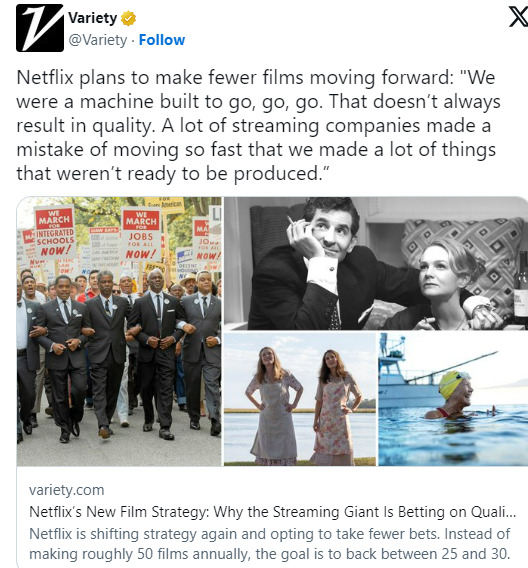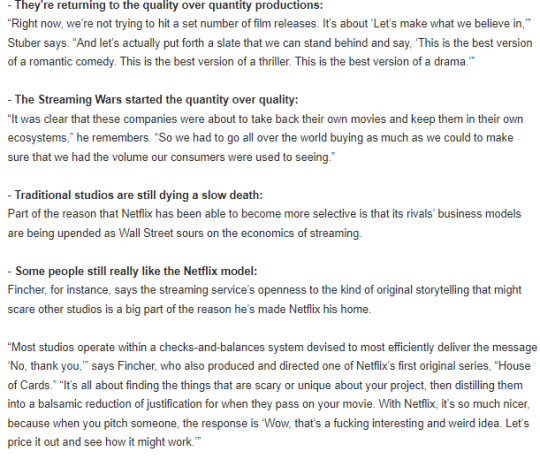#Netflix and their business models
Text
Stranger Things season 4 didn't need to be split into 2 volumes. I honestly don't see how it uplifts or adds to the storytelling.
What I do see are the other shows released in between the volumes, the viewership overlap, and how it forces viewers to make a choice between which shows to watch. And I realize, they can just be watched at a different date but the next 30 days (this differs from company to company) is CRUCIAL for binge series to rack up as many watched hours as possible to determine whether it's worth renewing or not. Scheduling is VERY important and can determine whether a show lives or dies.
Way back back, when streaming and OD weren't an option, there were so-called death slots which are a combination of undesirable days and times (Tuesdays at 10pm, Fridays, and Saturdays and others). Any show slipping in the ratings or a show that was very niche would be placed in these slots to die and so there was a viable excuse to cancel them. They can cancel them and say 'oh look, we tried'.
So now, death slots have been modernized for streaming, but now it's relies on when the entirety of show is released and what's being released before and after it. Stranger Things is juggernaut behemoth of a show, for good reason, so ANYTHING released around it is gonna take a massive viewership hit so for Netflix to split the 4th season, release the shows around it (w/ little to no promotion outside of cast and fans) is fucked up because they clearly have shows they want to struggle if not fail so they can say 'oh look, we tried'.
#Netflix and their business models#ugh#they're awful#Netflix#stranger Things#the umbrella academy#first kill#LGBTQ#not that the umbrella academy needs any help#but it just released a little over a week ago#they keep wondering why they're hemorrhaging customers#bad business#not to mention how will and robin storyline#because ugh#glad at least they didn't kill them off#dividing viewership
13 notes
·
View notes
Text
Watching a Netflix show nowadays is like curling up next to a warm fire on a cold winter’s night and reading your new favorite book and just as you get to the good part someone walks past, yanks it out of your hands and throws it into the fire.
#netflix#they really said fuck having endings#we're only about the beginning and sometimes the middle#a good ending shouldn't be kindle for a business model that's on fire#this is exhausting#too many good shows#warrior nun#1899#first kill#teenage bounty hunters#and on and on and on#television
5K notes
·
View notes
Text









like or reblog if you save.
#business proposal icons#gugudan icons#sejeong icons#kim sejeong icons#lq icons#kpop icons#kdramas icons#doramas icons#actress icons#kactress icons#kgirls icons#netflix icons#ulzzang icons#asian icons#site model icons#korean icons#femaleidolsedit#messy layouts#packs#moodboard
425 notes
·
View notes
Text
apple tv and netflix are tied for most useless streaming service. neither of you will survive the revolution
#i got the apple tv free trial because my yo-ho-ho site for ted lasso was temporarily down#and holy shit it is bad#there's like nothing good on there and half the time the page doesn't load and the other half it shoots up an error message#the only way to get rid of the error message is to log out and log back in again#as for netflix... well. well!!!#like. guys. you do realise your entire business model hinges on supposedly being more convenient than piracy lol#maybe consider gitting gud
28 notes
·
View notes
Text
marvel studios making tv has been a trainwreck of a business model from the start, but seeing people trying to imply that netflix had a good model for making tv in comparison. like are we talking about the same netflix studios. the streaming service. hello.
#it's already documented how netflix is a bad business#not even getting into how much the mcu shows there were managed. it's clear how they rotted applying the mcu model to tv in a different way
13 notes
·
View notes
Text
you know what netflix meet me in the dennys parking lot
bc fuck you for canceling shows
shadow and bone
warrior nun
first kill
#Netflix#shadow and bone#warrior nun#first kill#Netflix is a bunch of netfucks#Netflix’s business model is netfucked#im sure there are others but I cant think of them feel free to add more and make the list longer
9 notes
·
View notes
Text
The Lockwood & Co. cancellation was expected but honestly so devastating. I'm disappointed we won't get to see Holly on the screen, or to see what fresh adaptation decisions would be made for the rest of the books. It's been wonderful getting the resurgence of fandom that came with the release of the show, and I fully expect to keep writing and making content for the series despite this.
#lockwood and co#lockwood and co netflix#really showing the issues with netflix's business model huh
36 notes
·
View notes
Text
This is such a long post that nobody asked for but I've been seeing Discourse again...
I feel like something that’s missing in most of the discussions I’ve seen on Tumblr about how streaming companies like Netflix have changed TV production for the worse is the profit motive. Or at least, it’s misunderstood. For example, I see a lot of people complaining about how Netflix only considers a show worthwhile if a bunch of people binge it as soon as it comes in, which is true - but I don’t know that everyone understands why, and it's lead to a skewed perception of what's actually going on, and why various studios and platforms make the decisions that they do.
The thing about Netflix is that it’s a public company that's currently unprofitable - so, every single thing it does is oriented toward "growth" (gaining new subscribers). Every show they decide to invest in, they do so because they think it’ll make people who don’t have Netflix want to get Netflix. And if they launch a show, and a whole bunch of new people join the platform, AND their viewer data shows that this show received disproportionate viewership in the same month all those people joined the platform - then it was a good investment. The further out you go from the release, the less correlation there is between the viewership of a show and new subscribers, so the less those viewer numbers matter to them.
Additionally, people talking about the show is more valuable to them than people actually watching it, because people talking about the show gives them free word-of-mouth marketing. Once your friend has bought a Netflix subscription, Netflix doesn't care what they watch, or at what pace. So obviously, if you can make everyone feel like they need to watch the entire show RIGHT NOW because everyone is talking about it and they can't avoid spoilers, that's a much stronger marketing strategy than letting people watch at their own pace.
And that’s why seasons are so short - a longer season costs more money and won’t bring in any extra subscribers, so it's a bad investment. It’s also why Netflix shows tend to be cancelled after only a couple of seasons - if a show hasn’t brought in many new subscribers after the first two seasons, it’s not likely to do so in the future, and so it becomes a poor investment, regardless of how many people already on the platform love it. And even beloved shows like Stranger Things eventually reach a point where everyone who loves it is already on the platform, and even though it's still massively popular it's no longer profitable on the same scale.
All of this is to contrast with network TV, where the revenue comes from advertisers. The more eyeballs are on a show, the more money a network can charge for ad space during that show. So the more beloved a TV show is, the more episodes you want in a season; even if the quality of some of those episodes is poor because the creative team is overworked and underpaid (ie exploited), people will still tune in and you’ll still make money. And that’s also how you end up with shows of 10-15 seasons, even if the show starts to suck around season 8 or 10; as long as enough devoted fans are still watching the show, they can still charge mega ad dollars and make a lot of money. A long-running show with name recognition will make more money, even when it sucks, than an excellent brand-new show with no name recognition. It also means that shows that are self-contained “plot of the week” type shows do a LOT better than stories with season-long arcs, because those shows are more likely to attract casual viewers in addition to regular ones, and people are less likely to abandon the whole show if they miss an episode or two. Plus, if you don't need to worry about the order a season airs in, you can make a lot more money off of rerun adspace outside of the regular season.
And finally, growth looks different for a network. On Netflix, a single person can only provide a single unit of growth, because you're only going to purchase one subscription, so there's very little incentive for Netflix to cater to existing subscribers so long as the platform is 'good enough' for them to avoid cancelling. On the other hand, network growth is calculated based on viewership. So, let's say I watch "The Office" on NBC every week, and nothing else. And then one day, a friend tells me how much they love this other NBC show, "30 Rock", that's halfway through its second season, so I start watching that. That's growth for NBC! They can now charge a little bit more for ad space on 30 Rock than they could before - and it's happened without a whole new person needing to be introduced to their network. So there's a strong incentive to pay attention to what existing viewers want, rather than just focusing on what brings in new viewers. After all, not watching one specific show is a much easier decision than cancelling an entire platform subscription. (The downside of this is that network TV creators are far more beholden to the demands of the audience than a show on a platform like Netflix or HBO, and that can lead to sacrificing some creative integrity).
Overall my point is that the entire structure and shape of TV shows has ALWAYS been motivated by profit. That doesn’t mean the complaints about Netflix are invalid - they are VERY valid and I agree with most of them - but I think it’s important to diagnose the problem correctly: the people with the money to make a tv show are also usually the people who would like to make as much money as possible off your tv show, and will manipulate it accordingly. What’s the solution? I’m not sure, but pretending that these studios are making decisions based on “bad data” or “not understanding what people want” or just pure caprice is simply naive. Its not that they don't know what you want - they just don't care.
#sorry this is a long rant about something no one asked#I just saw a couple of posts that bothered me bc they were missing the point#everything you hate about Netflix is bc of the profit motive. and that’s why it won’t change#those execs aren’t stupid they’re just greedy#and netflix's business model has been artistically hot garbage from the beginning#also the reason premium cable (like HBO and Showtime) tend to produce the best quality TV#is that they need to produce TV good enough to bring in new subscribers. but which is consistently good enough from week to week to keep#those subscribers from cancelling#but thats also why those networks tend to put out shows with shorter seasons#and even popular shows rarely run longer then 7 or 8 seasons at MOST#because at a certain point it stops driving new subscriptions#(and btw thats why HBO isnt pressuring Jesse Armstrong to make succession last forever. they're gonna hit diminishing returns soon)#and#thats why platforms like D+ which have smaller quantity release their shows week-to-week#they're trying to replicate that business model bc they don't have Netflix's selection
19 notes
·
View notes
Text
every day i’m more and more grateful rogue one was a movie and not a tv show. lmao
#and that andor is a prequel and all the characters fucking DIE so the ending is fixed#and i know it’s disney and not netflix but this business model is pervasive#r1#UGHHHHHH
4 notes
·
View notes
Text
finished Sonic Prime! its nice to finally take down the spoiler filters! also what the fuck whens the rest
#tormented by netflix's business model once more... never again. (literally cus i vowed to close my account after watching this)#sonic prime#sonic the hedgehog#sth#prime#me talking
9 notes
·
View notes
Text
I know people say it a lot but like. with all the planned grishaverse shows canceled (and every Other show netflix has canceled for no reason), what the hell is netflix’s plan after like, next year? once stranger things and the umbrella academy end, what big show do they have left to keep people subscribed? fucking. OBX s4?
#netflix#it’s truly such a strange business model#just because you were like The First streaming service doesn’t mean you have like. The Right to be profitable.
1 note
·
View note
Text


The Finchers though, lbr are few and far between anymore with Netflix originals.
Also, BRING BACK MINDHUNTERRRR
Evelyn Hugo better be treated well. GDI.
1 note
·
View note
Text
ngl i think its genuinely kind of delusional to make the argument that netflix is losing all this money over dave chappelle’s netflix special. that’s such a strange and myopic take
#people love dave chappelle lol and the special itself was popular#netflix’s struggles are multifaceted and have more to do with their business model recent changes to pricing and account sharing and their#place in the streaming marketplace…
4 notes
·
View notes
Text
If Disney plus doesn’t have exactly what you want to watch on there, it doesn’t even make an effort. Just throws you it’s big thing of the moment. I search ‘leverage’ and it doesn’t give me ‘white collar’ or ‘criminal minds’ or anything that might kinda sorta be the sort of thing I’m feeling like watching. It doesn’t pull up ‘Angel’ because they both star Christian Kane, or ‘the walking dead’ for Aldis Hodge.
It gives me Hocus Pocus 2.
#Netflix has major business model issues#but you’ve got to admit it nailed the interface#and I don’t understand why other streaming sites don’t follow its lead#btw I have Disney under duress I didn’t choose to get it
2 notes
·
View notes
Note
Nobody is making anyone go into scriptwriting. No one is born in a Netflix company town where their dad takes them into the script mines at age 12. Fuck writers who want to get paid more than once for the same job. They should only get residuals AFTER all the people who do REAL WORK, like construction, grips, costume, makeup & animators etc. Most of them are much better at their jobs than writers especially for streaming services, and they are what screenwriters can lean on & novelists can't.
People need to realize that the unions for white collar people like WGA or SIEU or NEA (public sector unions are why cops who kill the people they were supposed to serve & protect remain employed get pensions) is not the AFL-CIO or any other historical union fighting for the lives of the people who built the country's industry and made it run, any more than the NRA are the Minutemen of 1775 New England.
First, go fuck yourself, you fucking scab. No, seriously - you don't come to my blog and spout off about what workers deserve unions and decent pay and what ones don't, like it's your fucking decision. The intellectual labor that writers perform is just as real as any other work done on a film set - "all who labor by hand or brain" is the inherent logic of industrial unionism for a reason.
Second, writers aren't asking to get paid more than once: residuals are deferred pay, you absolute moron. In Hollywood, whether it's writers or actors or voice talent or whatever, you get a small fraction up front - it's usually an ok check, depending on the union's day rates and so forth, but you can't make a living off stitching these together - and then most of your pay comes from monthly royalty checks that provide you with the income you need to live off when you're between jobs.
The problem is that, historically in Hollywood, residuals have been structured with a very long "tail" - the payments start out relatively low and then get more generous over time as the show has more seasons and (presumably) goes into syndication. This doesn't work with streaming's new business model, where increasingly shows are getting 2-3 seasons max and streaming services have become increasingly quick to not just cancel shows but yank them off their servers in order to avoid paying residuals.
So what WGA writers are fighting for is a system that ensures writers (but also actors and other creative workers, because the unions pattern bargain) get a fair share of the show's revenue, even if the show is only given 2-3 seasons.
Third, the U.S labor movement would not exist today if it wasn't for white collar workers and public sector workers. About half of the U.S labor movement - 7 million workers - is public sector, and those workers are overwhelmingly women of color, mostly working as either teachers or postal workers. Likewise, about half the U.S labor movement is made up of white collar workers, and we're graduate students and adjuncts and lab researchers, teachers and social workers, administrators and IT departments.
I'm both public sector and white collar, and I'm a member of an NEA union. I'm an adjunct professor who earns $6,000 a course and it's my job to get working adults with jobs and families who've never gone to college or who've been out of higher ed for a decade to graduate with a bachelor's or a master's. If you don't think that's real work, you're free to research and write all the lectures and powerpoints, deliver those in an entertaining and educational fashion, answer a flood of questions from students who need help navigating academia, and then grade all the midterms and finals and research papers.
18K notes
·
View notes
Text
"Discover how Ryan Reynolds' exit from Mint Mobile signals the future of affordable wireless plans"RyanReynolds #MintMobile #affordablewirelessplans #InvernessGraham #entrepreneurship #prepaidwirelesscarrier #MaximumEffort #RickMoranis #Diageo #aviationAmericangin #marketingcampaigns #businessmodel #expansion #internationallaunch #UnitedKingdom #Comcast #productioncompany #Netflix #RedNotice #mobileplans #online #lowercost #authenticexperience #personalizedexperience #growth #success #future
The actor and entrepreneur Ryan Reynolds sold his stake in the mobile company Mint Mobile for an undisclosed amount to investment firm, Inverness Graham. Mint Mobile is a prepaid wireless carrier that offers plans at a lower cost compared to traditional carriers, and Reynolds was known for his involvement in its marketing campaigns. The actor co-founded the company in 2019 after becoming a…

View On WordPress
#affordable wireless plans#authentic experience#aviation American gin#business model#Comcast#Diageo#entrepreneurship#expansion#future.#growth#international launch#Inverness Graham#lower cost#marketing campaigns#Maximum Effort#Mint Mobile#mobile plans#Netflix#online#personalized experience#prepaid wireless carrier#production company#Red Notice#Red Notice. Ryan Reynolds#Rick Moranis#Ryan Reynolds#success#United Kingdom
0 notes